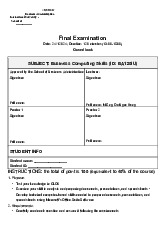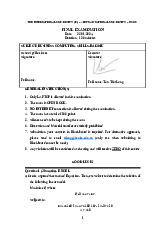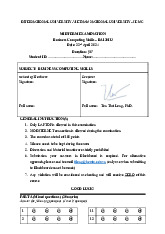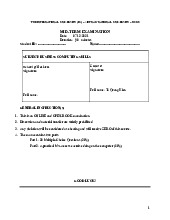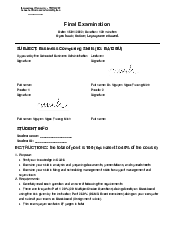








Preview text:
Vietnam National University – HCMC International University
SCHOOL OF BUSINESS ADMINISTRATION COURSE SYLLABUS* BA120IU Business Computing Skills
Note: The outline with specific venue and time, and updated learning
materials for the current semester will be provided to the enrolled students by the lecturer BA120IU
VNU – International University Business Computing Skills
School of Business Administration 1. COURSE STAFF Lecturer: Teaching Assistant: TBA Room: TBA Telephone: TBA E-mail: TBA Consultation Hours: TBA
Should the students wish to meet the staff outside the consultation hours, they are advised
to make appointment in advance. 2. COURSE INFORMATION
2.1 Teaching times and Locations Lecture: TBA Venue: TBA 2.2 Units of Credit
This course is worth 3 credits.
2.3 Parallel teaching in the course
There is no parallel teaching involved in this course.
2.4 Relationship of this course to others
2.5 Approach to learning and teaching
Employing the interactive learning and problem-based teaching approach, this course
emphasizes the interaction between lecturers and students. The lecture materials will be
uploaded in Blackboard to help the students to preview the materials and to concentrate
on listening and critical thinking during the lecture. This will help students to interact
with the lecturer during the classroom. The sessions for presentations and discussions
comprise company case studies as well as answering some theoretical and conceptual
questions, which help the students to see how the concepts are applied in the real
international business context. Students will present the case to the class and discuss with the peers. 3. COURSE AIMS AND OUTCOMES 3.1 Course Aims 2 BA120IU
VNU – International University Business Computing Skills
School of Business Administration
This course aims to provide thorough instruction on the various uses of the computer,
important accessories, networking principles. In addition, Students will be introduced the
introductory skills, knowledge and attributes required to undertake a limited range of
tasks and routine procedures in an office using a computer.
Furthermore, this course aims to provide participants who require retraining in
computerized applications for clerical occupations with an introduction to a minimum of
one software package used in an office. 3.2 Student Learning Outcomes
After completing the course, students should have developed skills in
Develop critical thinking skills in the use of information and communication technologies (ICT).
Develop technical computer based skills needed to prepare documents,
presentations, and spreadsheets using Microsoft’s Office Suite Software (focusing on Excel, and Access).
Employ self-directed strategies to learn new features of software packages and other technology.
Compile written directions, lab project, and specific business documents for other co-workers.
Use filing and schedule management skills to support management and supervisors.
Demonstrate Internet skills including e-mail management, web research, and document exchange. 3.3 Teaching Strategies The learning system
in this course consists of lectures and scheduled
presentations/discussions. Lectures elaborate the appropriate theoretical content in the
textbook and readings. There are lot of real works will be provided. Instructor will use a
business simulation to teach students how to apply computers skills to improve their
business operation and development. 3 BA120IU
VNU – International University Business Computing Skills
School of Business Administration
4. STUDENT RESPONSIBILITIES AND CONDUCT 4.1 Workload
It is expected that the students will spend at least six hours per week studying this course.
This time should be made up of reading, research, working on exercises and problems,
and attending classes. In periods where they need to complete assignments or prepare for
examinations, the workload may be greater.
Over-commitment has been a cause of failure for many students. They should take the
required workload into account when planning how to balance study with part-time jobs and other activities. 4.2 Attendance
Regular and punctual attendance at lectures and seminars is expected in this course.
University regulations indicate that if students attend less than eighty percent of
scheduled classes they may be refused final assessment. Exemptions may only be made on medical grounds.
4.3 General Conduct and Behavior
The students are expected to conduct themselves with consideration and respect for the
needs of the fellow students and teaching staff. Conduct which unduly disrupts or
interferes with a class, such as ringing or talking on mobile phones, is not acceptable and
students will be asked to leave the class. More information on student conduct is
available at the university webpage. 4.4 Keeping informed
The students should take note of all announcements made in lectures or on the course ’s
Blackboard. From time to time, the university will send important announcements to their
university e-mail addresses without providing a paper copy. The students will be deemed
to have received this information. 5. LEARNING ASSESSMENT 5.1 Formal Requirements
In order to pass this course, the students must:
achieve a composite mark of at least 50; and
make a satisfactory attempt at all assessment tasks (see below). 5.2 Assessment Details Mid-Term Exam 25% Project 15% 4 BA120IU
VNU – International University Business Computing Skills
School of Business Administration
Class Participation and Quizzes 10% Assignments 10% Final Exam 40% Total 100%
5.3 Project Report (Written Assignment)
Students are required to submit a project report in groups of three (3) on one topic.
Length and Style: Maximum 2,000 words, excluding footnotes, figures and references.
The format for assignments is to be double spaced with 2.5 cm margins and font size of
12. Please show the word count, along with all other details on the cover sheet.
The project will be assessed for analytical content and presentation. The same marks will
be awarded to all students in the same group. All work must be original and must not
have been submitted for any other subject or course here or elsewhere. Copying or
plagiarizing works of other authors, including your fellow students or cutting and pasting
from the internet and other sources is an offence and will be seriously penalized.
Due Date: The project report is due at (time) pm on (date, day). Assignments are to be
handed to the School of Business Administration’s Faculty Assistant or the lecturer at the Faculty Office.
Late work will be penalized at the rate of 25 percentage points per week day.
Students should keep copies of all work submitted.
5.4 Marking criteria (project report and case presentation) Marking Criteria Marks Learning outcomes/attributes Quality of arguments: 20
Ability to give compelling arguments and relevance, logic and cohesion reasoning to support analysis Use of frameworks to 20
Ability to structure problems in accordance support analysis
with theoretical frameworks and resolve them Use of case evidence to 20
Ability to conduct applied research to gather support analysis
data/information pertaining to the case Originality and usefulness of 20
Ability to engage in creative problem the analysis solving skills Organization, clarity of 20 Clarity of vision expression, editing etc
5.5 Class participation and Presentation
A minimum attendance of 80 percent is compulsory. Students will be assessed on the basis of: a) Presentation of case 10% 5 BA120IU
VNU – International University Business Computing Skills
School of Business Administration
b) Class attendance and participation 5% 5.6 Special Consideration
Request for special consideration (for final examination only) must be made to the Office
of Academic Affairs within one week after the examination. General policy and
information on special consideration can be found at the Office of Academic Affairs.
6. ACADEMIC HONESTY AND PLAGIARISM
Plagiarism is the presentation of the thoughts or work of another as one’s own. Students
are also reminded that careful time management is an important part of study and one of
the identified causes of plagiarism is poor time management. Students should allow
sufficient time for research, drafting, and the proper referencing of sources in preparing
all assessment items. The university regards plagiarism as a form of academic
misconduct, and has very strict rules regarding plagiarism. 7. STUDENT RESOURCES 7.1 Course Resources
Please note that it is very important to gain familiarity with the subject matter in the
readings and cases prior to attendance in classes. Required Textbooks:
1. James A. O'Brien, George Marakas (2008), Introduction to Information Systems, Mc-Graw Hill
2. Succeeding in Business with MS Office Excel 2007, Thomson Course Technology, 2008, ISBN 978-1-4239-0605-6
3. New Perspective MS Office Access 2007 Brief, Thomson Course Technology, 2008, ISBN 978-1-4239-0587-5
4. Case Grader - MS Office Excel 2007, Thomson Course Technology, 2008, ISBN 978-1-4239-9823-5 Optional Textbooks:
1. Fundamentals of Information Systems, 4th Edition, Thomson Course Technology, 2007, ISBN 978-1-4239-0113-5
Additional materials provided in Blackboard
The lecturer will attempt to make lecture notes and additional reading available on
Blackboard. However this is not an automatic entitlement for students doing this subject.
Note that this is not a distance learning course, and you are expected to attend lectures
and take notes. This way, you will get the additional benefit of class interaction and demonstration. Recommended Internet sites 1. office.microsoft.com 6 BA120IU
VNU – International University Business Computing Skills
School of Business Administration
2. http://www.educationonlineforcomputers.com 7 BA120IU
VNU – International University Business Computing Skills
School of Business Administration
7.2 Other Resources, Support and Information
Additional learning assistance is available for students in this course and will be made
available in Blackboard. Academic journal articles are available through connections via
the VNU - Central Library. Recommended articles will be duly informed to the students. 8. TENTATIVE COURSE SCHEDULE Week Topic Reading
Introduction to Computer and Information Systems - Computer System Basics - Intro. to IS Ch.1 1 - Human vs. Computer - Fundamentals Ch. 1 - Information Processing Cycle -
Information Systems in Organizations Hardware & Software - Computer Infrastructures - Intro. to IS Ch.2, 3 - Moore’s Law 2 - Fundamentals Ch. 2 - Types of Software -
Software Licenses and Software Piracy Internet Basics
Organizing Data & Information - Fundamentals Ch. 3 3 - Intro. to MS Access 2007 - Access Tutorials 1, 2 - Maintaining Database Tables MS Access 2007 Continued - Fundamentals Ch. 4 4 - Querying a Database - Access Tutorials 3, 4 -
Forms & Reports/Telecommunications -
Electronic Commerce and Transaction Processing Systems 5 - Fundamentals Ch. 5-7 -
Information & Decision Support Systems -
Specialized Business Information Systems Introduction to Excel 2007 - Excel Ch. 1, 2 6 -
Fundamental Excel Skills in Problem Solving - Statistical Analysis Tools MS Excel 2007 Continued - Excel Ch. 3, 4 7 -
Effective Data Display with Charts -
Applying Logic in Decision Making MS Excel 2007 Continued - Excel Ch. 5, 6 -
Retrieving data for Computation, Analysis and 8 Reference -
Evaluating the Financial Impact of Loans and Investments MS Excel 2007 Continued - Excel Ch. 7, 8 -
Organizing Data for Effective Analysis 9 -
Using Data Tables and Excel Scenarios for What-If Analysis 10 MS Excel 2007 Continued - Excel Ch. 9, 10 8 BA120IU
VNU – International University Business Computing Skills
School of Business Administration -
Enhancing Decision Making with Solver -
Trouble Shooting Workbooks and Creating Excel Applications - Systems Development 11 Fundamentals Ch. 8,9 -
Integrating MS Office Applications 12 Review 9
